They say you are what you eat, but did you know that your diet can also determine the health and radiance of your skin? From blueberries to sweet potatoes, nutrition for skin is as delicious as it is impactful. It’s time to go beyond expensive skincare products and delve into the powerful relationship between your grocery basket and a luminous complexion. From combating acne to reducing signs of aging, how diet affects skin is profound. With summer skin in mind, we’re uncovering what to eat for glowing, youthful skin. Get ready to transform your beauty routine from the inside out.
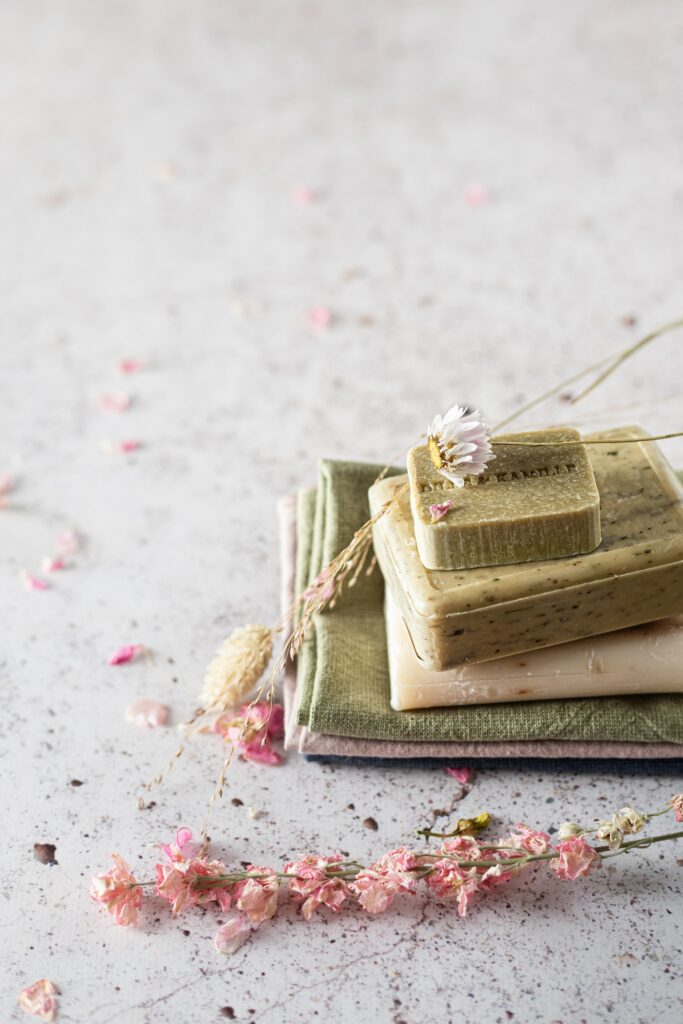
WHY IS SKIN HEALTH IMPORTANT?
Let’s start here. We all know our skin is important. First and foremost, it holds everything in, playing a crucial role in creating an airtight, watertight, and flexible barrier—between the outside world and our internal systems. As our largest (external) organ, it’s a defense against toxins. Secondly, it regulates our body temperature and aids in vitamin production. Lastly, skin is a reflection of internal health. Addressing skin issues can often uncover underlying systemic imbalances or health conditions!
Eat Your Way To Gorgeous Skin
Spoiler alert: what you eat doesn’t just satisfy your taste buds. It has a significant impact on the health and appearance of your skin. That’s right, your diet holds the key to unlocking a radiant complexion. From everyday superfoods to skin-sabotaging culprits, every bite you take shapes your skin’s destiny. Whether you’re craving that enviable glow—or battling stubborn breakouts—it’s time to nourish your skin from within. Remember, the recipe for flawless skin starts with a healthy, well-balanced diet. Bon appétit for beauty!

COMMON SKIN WRECKERS
In the pursuit of clear, glowing skin, skincare routines and specific products typically take the spotlight. They promise to reverse oxidative damage to skin cells, reverse aging, minimize pores, and more. That said, in addition to external sources (pollution and too much sun exposure), internal sources are also skin wreckers. Think: eating an abundance of inflammatory oils, processed foods, and sugar. Drinking too much alcohol, stress, and poor quality sleep also increase oxidative damage. While we can’t stop the natural aging process—or rid ourselves completely of external sources—we can fortify our skin with the foods we put on our plates.
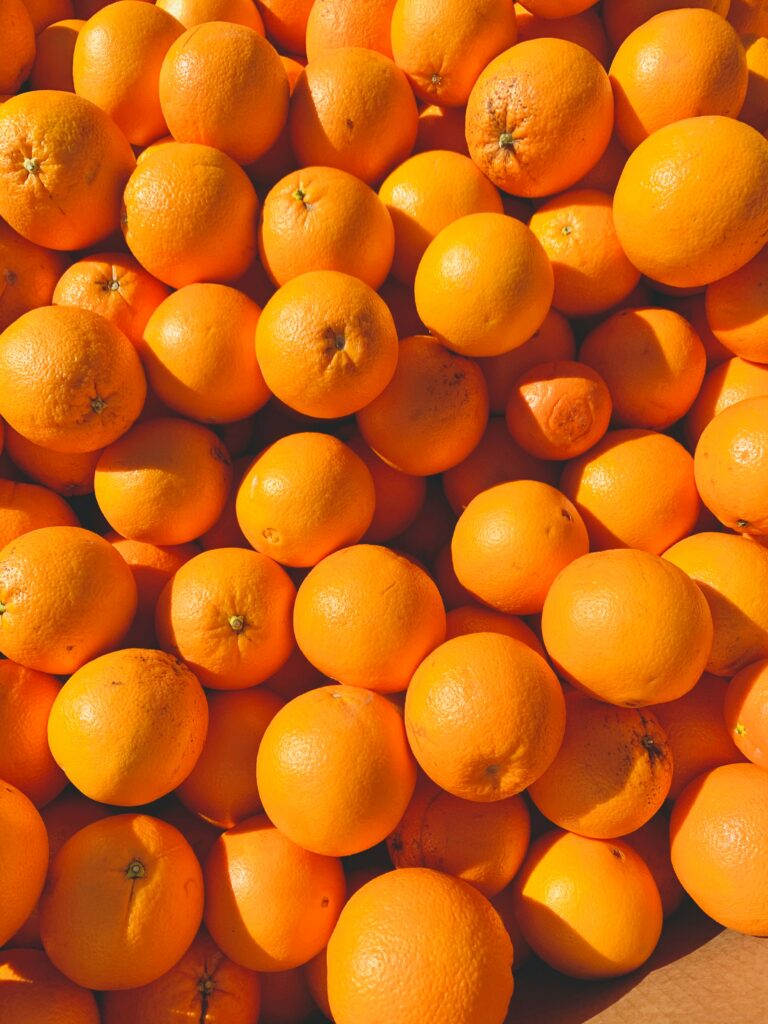
blood sugar and skin
Maintaining stable blood sugar levels is crucial for overall health. But its impact on skin is particularly interesting. High GI foods, such as refined carbohydrates and sugar, cause a rapid spike in blood sugar levels. This leads to an increase in insulin. And elevated insulin levels trigger the release of certain hormones (IGF-1)—which stimulates the production of sebum, a naturally occurring oil in the skin. Excess sebum can clog pores, causing breakouts and inflammation. Additionally, constant blood sugar spikes create a process called glycation. Through glycation, the skin loses elasticity, becomes prone to wrinkles, and appears aged. Conversely, a diet rich in low GI foods helps maintain steady blood sugar levels, promoting healthier skin. More on these, below!
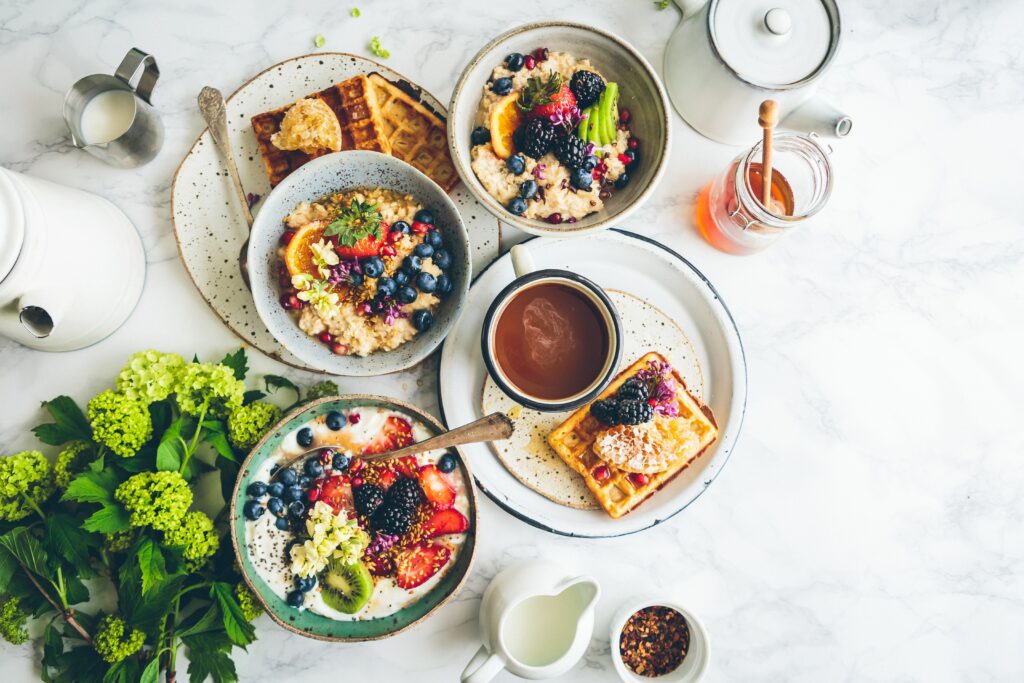
Nutrients for skin health
Unsurprisingly, certain vitamins and minerals play a vital role in maintaining vibrant skin. Along with keeping blood sugar balanced—via protein and fiber—aim to incorporate the following nutrients into your meals.
Antioxidants
Antioxidants are key for protecting the skin from oxidative stress (I.e. UV radiation and pollution). Eating antioxidant-rich foods, like berries, citrus fruits, leafy greens, and nuts can help combat free radicals. Thus, improving skin health. In many ways, the benefits of antioxidants are endless: they reduce inflammation, improve energy, support cognitive function, balance hormones, and of course, aid in skin health. In some cases, they can reverse chronic illness and disease!
omega-3 fatty acids
Additionally, omega-3 fatty acids—found in fatty fish, walnuts, and flaxseeds—possess anti-inflammatory properties. These healthy fats help reduce skin inflammation, redness, and promote a more even complexion. Vitamin C aids in collagen synthesis, supporting skin structure and elasticity. Foods like oranges, strawberries, and bell peppers are excellent sources of this essential nutrient.
Protein
Eating protein is essential for healthy skin. Reason being? Proteins are the building blocks of skin tissue. Proteins, such as collagen and elastin, provide structural support, encouraging a youthful and firm appearance. Protein also helps in the production of new skin cells, aiding in skin repair and regeneration. Including adequate protein in your diet can contribute to maintaining the integrity, strength, and overall health of your skin.
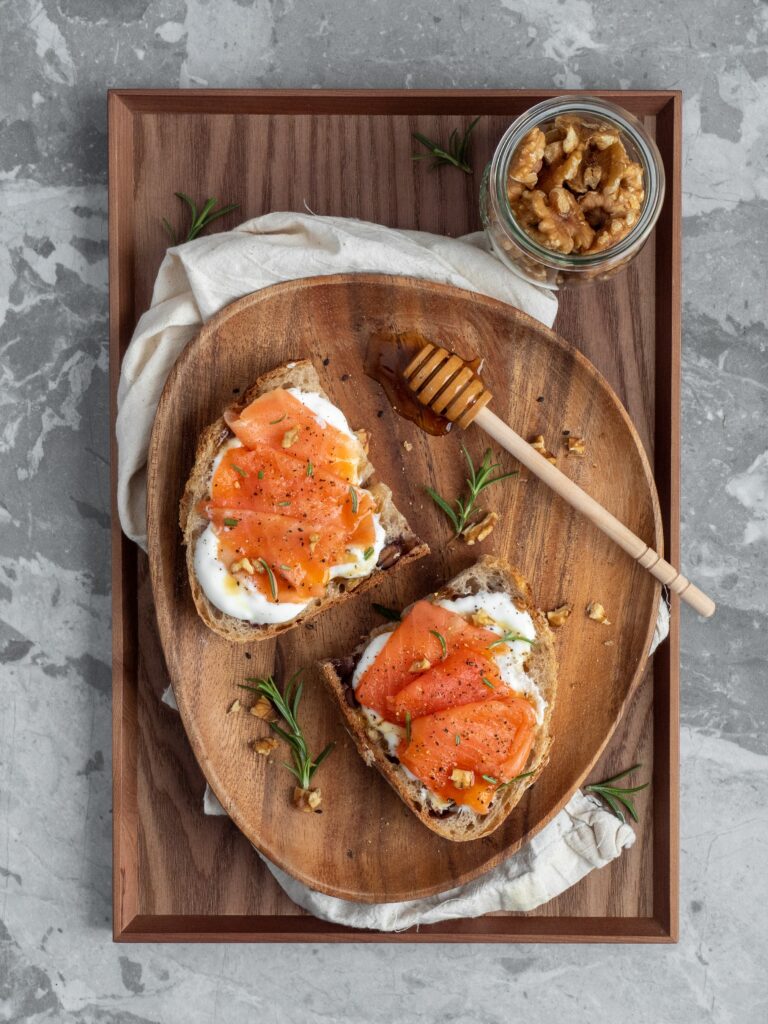
10 Foods To Eat for Glowing Skin
Full of color, texture, and micronutrients, these real, whole foods create the foundation for beautiful skin.
Aloe Vera
Have you tried aloe vera? Not as common as the other ingredients below, aloe vera is renowned for its remarkable benefits. Because of its gel-like substance, it helps hydrate the skin! Aloe vera has anti-inflammatory properties, making it effective in soothing and calming irritated or sunburned skin. Additionally, aloe vera can help regulate oil production (helpful for those with acne-prone skin). Its gentle and moisturizing properties make it suitable for all skin types, contributing to a smoother, more radiant complexion.
AVOCADO
All hail the mighty avocado. When it comes to skin health, omega-3 fatty acids are key. Aim for a combination of EPA and DHA from salmon, walnuts, hemp hearts, chia seeds, ground flaxseed, and avocados. The high content of vitamin A in avocados can help shed dead skin cells, encouraging glowing skin. Their carotenoid content may also assist in blocking toxins and damage from the sun’s rays and also help to protect against skin cancers.
BELL PEPPERs
Along with berries, red bell peppers are loaded with antioxidants. And when it comes to anti-aging, antioxidants reign supreme. Thanks to their high vitamin C content (which is necessary for collagen production!), bell peppers can protect skin from sun damage, pollution, and other toxins.
BERRIES
Rich in age-defying antioxidants (anthocyanin), berries help protect skin from oxidative stress and premature aging. Like bell peppers, their high levels of vitamin C help promote collagen production, enhance skin elasticity, and reduce the appearance of wrinkles. With summer produce in mind, there’s no better time to add more berries to your breakfast.
CRUCIFEROUS VEGGIES
In addition to leafy greens, cruciferous veggies (like broccoli and cauliflower) are an anti-inflammatory, anti-aging powerhouse. They’re packed with vitamins C and K, antioxidants, fiber, folate, and more. Your body needs vitamin C for the production of collagen, the main protein in the skin that gives it strength and elasticity.
NUTS
Many nuts—especially almonds—are a great source of vitamin E. And vitamin E can help repair skin tissue, retain skin moisture, and protect skin from damaging UV rays. Walnuts, too, can help strengthen skin cell membranes, protect against sun damage, and give skin a beautiful glow by preserving its natural oil barrier.
SEEDS
Chia and flax are rich in omega-3 and omega-6 fatty acids. These two healthy fats have been shown to help restore the skin’s moisture barrier, especially in those with dry skin conditions, such as psoriasis. And don’t forget pumpkin seeds! Pumpkin seeds are a skin-loving superfood. They’re high in zinc, and zinc protects your cell membranes, helps maintain collagen, and promotes skin renewal. Add them to trail mix, sprinkle them on your salads, toss them into smoothies, or eat them with fruit.
PAPAYA
The wide range of antioxidants in papaya helps to fight free radical damage and may delay signs of aging. Papaya also contains an enzyme called papain, which provides additional anti-aging benefits. It works as one of nature’s best anti-inflammatory agents. It comes as no surprise that papaya is also found in many exfoliating products.
Seaweed
Seaweed (nori, kelp, and spirulina) is rich in vitamins and minerals, promoting skin health and combating oxidative stress. Additionally, seaweed is high in vitamin C, aiding in the production of collagen, promoting skin firmness, and reducing the appearance of fine lines and wrinkles. Add seaweed to deconstructed sushi bowls or snack on roasted seaweed with sliced avocado.
WATERCRESS
This nutrient-dense and hydrating green is a powerhouse vegetable. It packs several important nutrients but is extremely low in calories. It contains a plethora of antioxidants and minerals to support your skin (and help with reversing sun damage!).
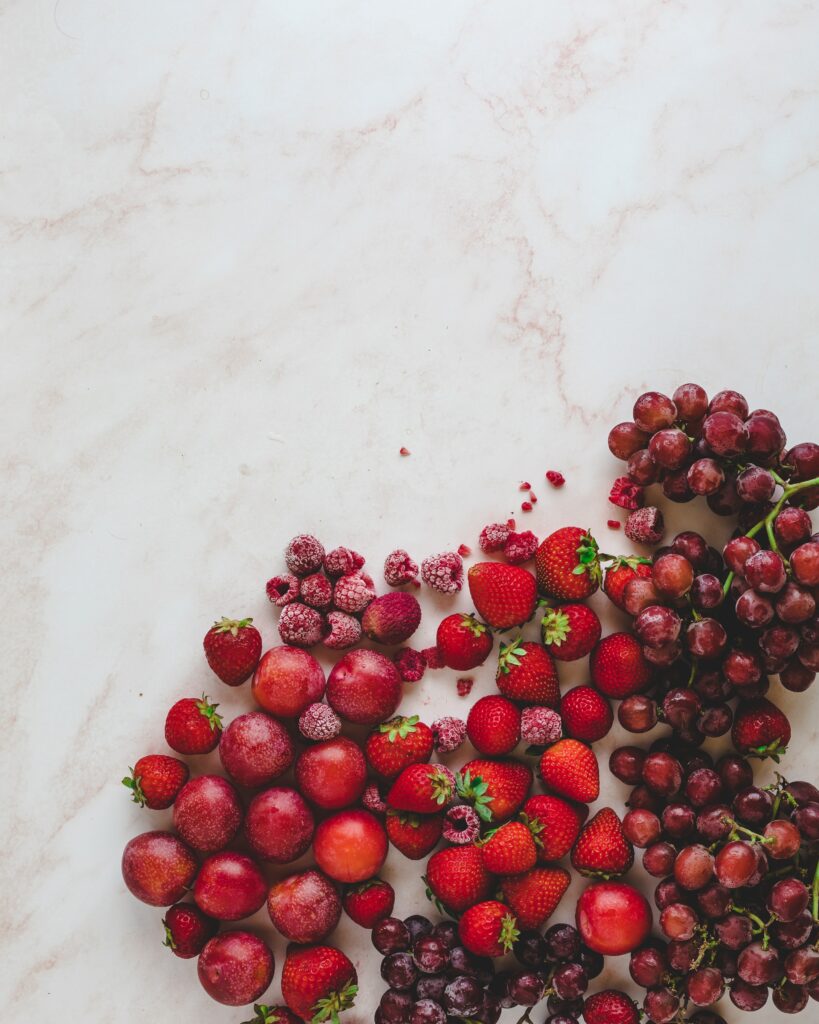
Furthermore, maintaining proper hydration is crucial for healthy skin. Drinking an adequate amount of water keeps the skin hydrated, improves skin elasticity, and helps flush out toxins.
Images courtesy of Unsplash.
This article contains affiliate links. Thank you for supporting Wellness with Edie! This article is for informational purposes only. It is not, nor is it intended to be, a substitute for professional medical advice, diagnosis, or treatment and we recommend that you always consult with your healthcare provider.



Leave a Reply